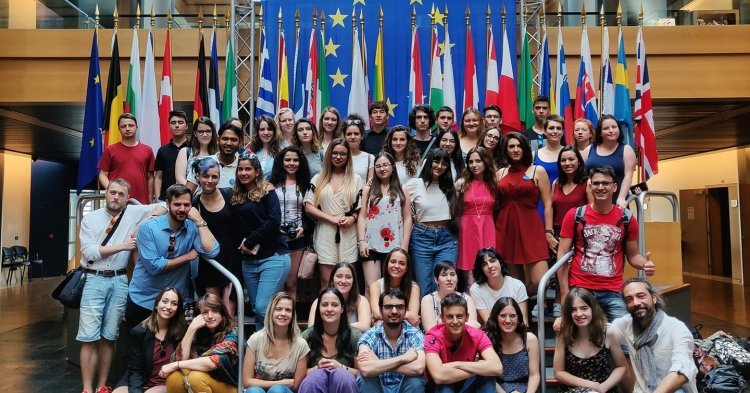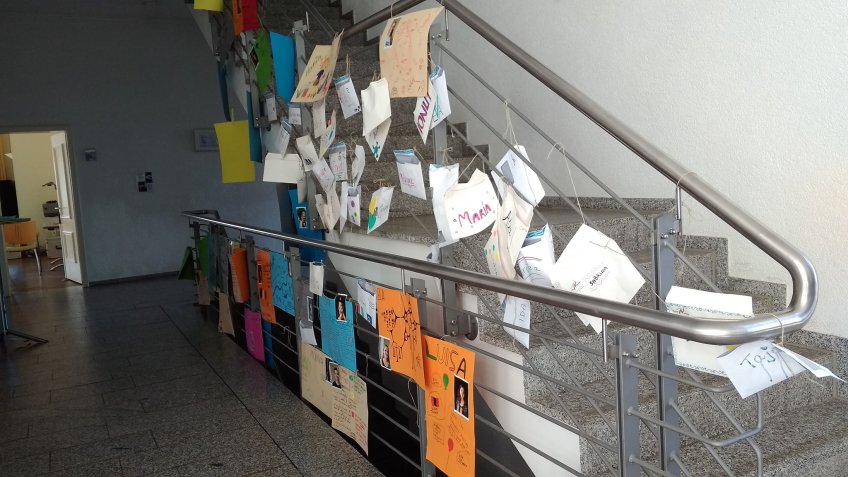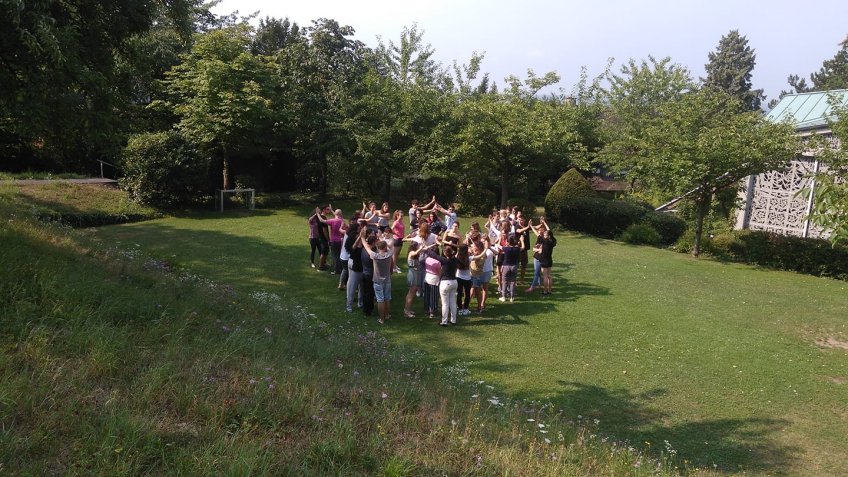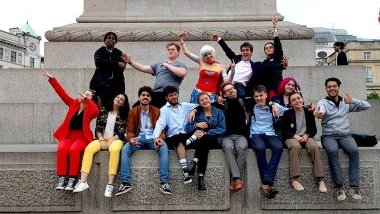Flight 306 from Frankfurt to Bucharest. The tiny plane operated by the national airline of Romania was passing through the airspace of several countries on its way back home. In seat 9D, however, memories were gushing through me. Foreign – but familiar – names, jokes, nicknames, pictures of Strasbourg and Heidelberg, unrelenting French songs, German cuisine and long debate sessions were now confined to memory. The act of remembering was paused only by devious schemes seeking to bring those that I had met closer to Bucharest. Just so I could see them again. Argue with them again. Laugh with them again.
How could faces and places that I had not known 15 days prior now impact me to such an extent? What changed in me during those two weeks?
A short history of interaction
Let’s start from the beginning. For much of human history, one could travel over longer distances and interact with people from different cultures only with the occasion of armed conflict. Paradoxically, it was war that facilitated cultural, economic, social and political interaction and exchange. Soldiers would move through territories – even ones which already belonged to their polity – and spread ideas, news and goods. The Napoleonic armies, for example, spread ideas of revolution and change wherever they marched.
Apart from war, the inhabitants of a country’s border regions and its merchants would, naturally, have more contacts with foreigners than the usual peasant or city-dweller. The same can be said about the more cosmopolitan lords or wealthy members of the bourgeoisie. However, most of the people within any European country would have lived out their lives within a very limited space, interacting solely with others similar to them. Even as they appeared, the modern means of transportation, including the modern trains, were too expensive for most. And so, Europe was separated. The average Italian or Spaniard could imagine what a German or a Pole could be like, but that’s it.
Erasmus+
That previous separation has changed only recently. Rail lines are connected, cars are faster and flights are cheaper, but that is only a detail nowadays. Our entire economic and social systems are founded on the fact that we go outside our own borders, with the political sphere close behind.
The European Union, the most daring and advanced project of human cooperation in history, exists solely due to these interwoven links between different communities. Aware of this fact, the Union promotes a higher degree of communication and cooperation among those who will one day lead their respective countries – the young. That is where the Erasmus and Erasmus+ programmes come in.
Lesser known than its more academically inclined counterpart, Erasmus+ has been budgeted with a sum of 14.7 billion euro for the period between 2014 and 2020. Its aim is to develop the skills necessary for future employment, as well as offering opportunities for non-formal education to the European youth.
More than that, however, it seeks to achieve something less quantifiable – bringing together people from different countries and introducing them to each other through youth exchanges and training projects. One such project, funded partly by the EU through Erasmus+, is European Youth Weeks, taking place in the small town of Heppenheim, Germany.
European Youth Weeks 2018
To be honest, before attending EYW I had an unfavorable opinion of such training programs. Non-formal education sounded to me like pretending to acquire skills while actually taking part in games better fit for 6-year-olds. The staunch wannabe academic and arrogant introvert in me looked with horror at sitting in a circle and talking about feelings.
EYW proved me wrong.
First of all, the venue was incredible. Haus am Maiberg, a facility designed for political education, would easily match the comforts of a three-star hotel. The rooms were kept clean and the food was diverse enough so as to cover the dietary needs of every participant – although the Eastern European participants, myself included, met the occasional absence of meat with audible groans.
The garden, camp fire, cellar and multiple rooms provided the best environment for meaningful group discussions and sessions of private relaxation. The town itself was tidy, colourful and a pleasure to explore. By the end of the two weeks, I felt like I was leaving home.
Secondly, the trainers were wholly dedicated to the project and to each activity in particular. Friendly and helpful, they managed to fulfill multiple roles – designated educators, careful listeners, debate moderators, tour guides and (most times) the responsible adults of the group. As diverse as the attendees, the trainers nevertheless managed to work as a well-oiled machine, exemplifying teamwork with their own efforts.
Thirdly, the participants eventually approximated the closeness and familiarity of an enlarged family. With 50 people in the group, differences were obvious with every session of talks, and temperaments could not have been more distinct: fiery debaters and silent listeners, outgoing personalities and distant types, adventurous explorers and order-obsessed perfectionists, early risers and all-nighters.
I learned that the Spanish can make sangria out of anything and that they are masters of keeping a room cool; that the Italians are the warmest people you can meet; that the French are passionate debaters; that the Poles are best people with whom to explore a city; that the Bulgarians make the best friends and have the best jokes; that the Germans have a huge humanitarian scope and the ability to relate; that some form of radiation must have gifted all Croatians with both intellect and graceful physical appearance; that Greeks are faithful companions who’ll get lost with you in search of a phone and that Slovenians have a huge heart.
However, by the end of the 14 days, we were comfortable with each other, knowing the intimate likes and dislikes of those that had previously been mere strangers. Every activity, be it a childish game or a serious discussion, made me aware of the numerous dimensions of each person. They weren’t strangers anymore, they were my friends. We talked about identity, and how we formed our own. We tackled stereotypes, and faced what we would hardly admit in another setting. We met a member of the Bundestag, visited the European Parliament in Strasbourg and sat down with a journalists in order to figure out how the media reports on certain events.
The Dotted Map
Aside from the numerous lessons and shattered stereotypes, I took something else from my time in European Youth Weeks – a map of Europe. My new map is geographically identical to all others, but it also has lots of dots. These dots tell me that I have friends in Greece that I’d like to visit sometime soon. And in Italy. Spain. Slovenia. Poland. Croatia. Bulgaria. Germany and France. At the same time, I am a dot on their map.
And with enough many dots, you make Europe. How could you ever measure that?





1. On 15 August 2018 at 16:34, by Giorgio Clarotti Replying to: European Youth Weeks – The best 14 days of summer
Replying to: European Youth Weeks – The best 14 days of summer
Great text Radu. Indicating the benefits Europeans like you get from Erasmus and its peripherals (included in Erasmus +). However, to meet, you need to cross your border and 50% of Europeans never did so. Yes, you read well, an estimated 250 million Europeans never made use pf their EU given right to cross their border freely. This is why we, European Federalist from Groupe Europe (the Federalists working for an EU Institution) advocate that each European, when he becomes 18 should be able to send a 1 or 2 month project to the EU. All eligible ones, (i.e. not purely travel like the #DiscoverEU scheme granting them a free InterRail pass) would receive €1000 to realise it. At max, i.e. if all 4 million Europeans becoming 18 write a project, it will cost €4 Billion a year. As much as Erasmus, but for 100% of a generation, not 3% (like Erasmus) More info @ https://taxieuropa.blogactiv.eu/2017/10/14/becomingeu/
2. On 7 October 2018 at 12:54, by Letitia Burciu-Gerth Replying to: European Youth Weeks – The best 14 days of summer
Replying to: European Youth Weeks – The best 14 days of summer
Congratulation, dear Radu, to your first prize in #EUinMyRegion 2018 Blogging-Competition ! Great text ! I was very pleased to read you and I’am very proud of you . I look forward to reading more and hearing from you. With best regards, Letitia Burciu-Gerth
Follow the comments: |
|
